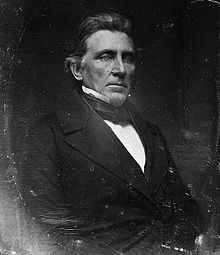William McKendree Gwin
| William McKendree Gwin | |
|---|---|
 |
|
|
United States Senator from California |
|
|
In office September 10, 1850 – March 4, 1855 |
|
| Preceded by | (State created) |
| Succeeded by | (Seat vacancy) |
|
In office January 13, 1857 – March 4, 1861 |
|
| Preceded by | (Seat vacancy) |
| Succeeded by | James A. McDougall |
| United States Representative (Mississippi) | |
|
In office March 4, 1841 – March 3, 1843 |
|
| Preceded by | Albert G. Brown |
| Succeeded by | William H. Hammett |
| Personal details | |
| Born |
October 9, 1805 Gallatin, Tennessee, USA |
| Died | September 3, 1885 (aged 79) New York City, New York, USA |
| Political party | Democratic |
| Alma mater | Transylvania University |
| Profession | Physician, politician |
William McKendree Gwin (October 9, 1805 – September 3, 1885) was an American medical doctor and politician, serving in elected office in Mississippi and California. In California he shared the distinction, along with John C. Frémont, of being the state's first U.S. senators. Before, during, and after the Civil War, Gwin was well known in California, Washington, DC, and in the south as a determined southern sympathizer.
Gwin was born near Gallatin, Tennessee. His father was the Rev. James Gwin, a pioneer Methodist minister, who served under the prominent Rev. William McKendree, America's first native-born Methodist bishop and namesake of the younger Gwin. Rev. James Gwin served as a soldier on the frontier under General Andrew Jackson. William Gwin pursued classical studies and graduated from the medical department of Transylvania University in Lexington, Kentucky in 1828.
As the son of a chaplain who was at the Battle of New Orleans, the young Gwin served as a personal secretary to President Andrew Jackson during the latter's 2nd term. Gwin then practiced medicine in Clinton, Mississippi until 1833, when he became the United States Marshal for Mississippi, serving for one year. He was elected as a Democrat from Mississippi to the 27th Congress of 1841 to 1843. Declining a renomination for Congress on account of financial embarrassment, he was appointed, on the accession of James K. Polk to the Presidency, to superintend the building of the new custom-house at New Orleans, Louisiana. He moved to California in 1849 and participated in the 1849 California Constitutional Convention. He also purchased property in Paloma, California, where a gold mine was established. The Gwin Mine would eventually yield millions of dollars, providing him with a fortune. He also organized the Chivalry wing of the Democratic Party.
...
Wikipedia
